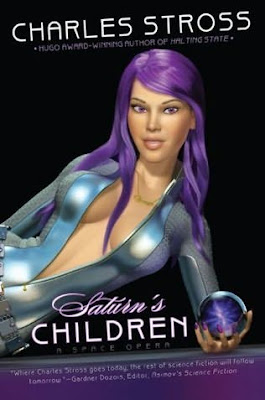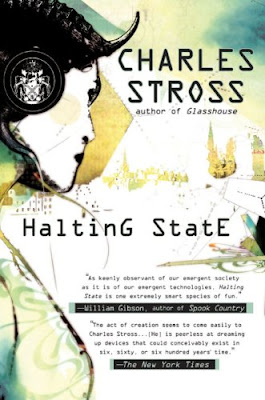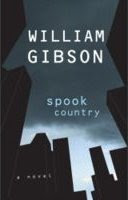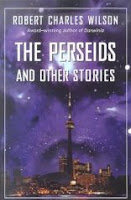 Charles Stross
Charles Stross was
a bit embarrassed about the cover to his new book
Saturn's Children. Charlie's a stand-up guy: he cares about people, women
specifically, and I think he was worried people would think he was a
creepy lech. But this book is about a lonely sexbot, and the cover doesn't just stand on its own: the book is a tribute to
Robert A. Heinlein's
Friday, and so is the cover. The book has an engaging milieu and a somewhat bewildering set of characters (personality versioning is hard to keep track of) and Stross maintains the pace and keeps the story moving. It's a good read, and a nice departure from the usual
strong-AI-ate-my-balls story lines. It's packed with obscure Heinlein references and in-jokes:
"Why bother learning all that biochemistry stuff—or how to design a building, or conn a boat, or balance accounts, or solve equations or comfort the dying—when you can get other people to do all that for you in exchange for a blow job?"an inversion of a fatuous quote by Lazarus Long in Time Enough for Love
 Friday
Friday was one of my favourite Heinlein books: for a nerdy gay teenager, an oppressed
bicurious gengineered courtesan spy was terribly compelling; plus she was black (covers lie), and she traveled the world in semiballistic missiles, tumbling into bed with various exciting characters of various genders. At the time
young-adult fiction didn't really speak to gay kids; at that time gay fiction was exclusively
boomers talking to their
contemporaries about
AIDS and
Fire Island (not to say that I didn't
devour those books, but they didn't mean as much to then as they do now). At the same time I was obsessed by comic books, particularly the
New Mutants, teenagers who were hated and oppressed because their secret mutant powers manifested themselves at puberty. So for a science-fiction-obsessed gay boy,
Friday presented a character with whom I could identify.
Cory Doctorow has spoken a great deal about why he chose to write
Little Brother, a young adult novel about technology and totalitarianism. He read Heinlein when he was a boy: he explained that young people are very idealistic and looking for different ways of looking at the world.
Friday did that for me, but I don't think of
Saturn's Children as a young-adult book: it is more of a story-driven contemplation on the evolution of identity with technology. The references to
Friday are creative and amusing, and the contrast between the two stories shows how the shape of the future has changed over the past twenty-five years.
Saturn's Children is seemingly addressed to people of Charlie's (and my) generation.






.jpg)

![Lenie Clarke, [anti-]heroine of the Rifters trilogy](https://blogger.googleusercontent.com/img/b/R29vZ2xl/AVvXsEgGOYLKHhvfevSwOuHIquaKKixKBM8LMU8ZZUqmg9pB3KIvrcgjVpKXOaFYAisDK_LkCgwOgLPwDAQWqGF4zlm8C9R4gX0tzgx8DX4OshjbfTHPsA_a2YeT_sqT1YQR-eFsvhYBSQ/s400/lanie.jpeg)

